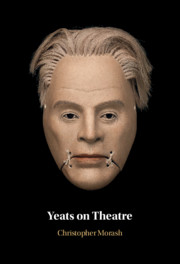Book contents
- Yeats on Theatre
- Yeats on Theatre
- Copyright page
- Contents
- Acknowledgements
- Abbreviations
- Introduction The Exact Moment
- Chapter 1 The Playwright as Thinker
- Chapter 2 The Fugitive Organum
- Chapter 3 Tragedy and Comedy
- Chapter 4 Form
- Chapter 5 Spaces and Objects
- Chapter 6 Bodies and Voices
- Chapter 7 Audiences
- Conclusion A Moment of Intense Life
- Notes
- Bibliography
- Index
Conclusion - A Moment of Intense Life
Published online by Cambridge University Press: 09 July 2021
- Yeats on Theatre
- Yeats on Theatre
- Copyright page
- Contents
- Acknowledgements
- Abbreviations
- Introduction The Exact Moment
- Chapter 1 The Playwright as Thinker
- Chapter 2 The Fugitive Organum
- Chapter 3 Tragedy and Comedy
- Chapter 4 Form
- Chapter 5 Spaces and Objects
- Chapter 6 Bodies and Voices
- Chapter 7 Audiences
- Conclusion A Moment of Intense Life
- Notes
- Bibliography
- Index
Summary
For W. B. Yeats, the theatre was not the distraction that his critics have so often considered it to be, but the means through which he thought most intensely and originally.To understand his theatre is to understand it as a form of thought, much as Alain Badiou argues is possible with theatre in putting it forward as a reason why theatre persists.For Yeats, the understanding of embodied thought, of the relationship between self and other, and self and the possibility of being other, was worked out in performance.The result was not simply a body of dramatic writing, but a hitherto overlooked body of dramatic theory that locates thinking at the moment of intense experience.
- Type
- Chapter
- Information
- Yeats on Theatre , pp. 198 - 202Publisher: Cambridge University PressPrint publication year: 2021

